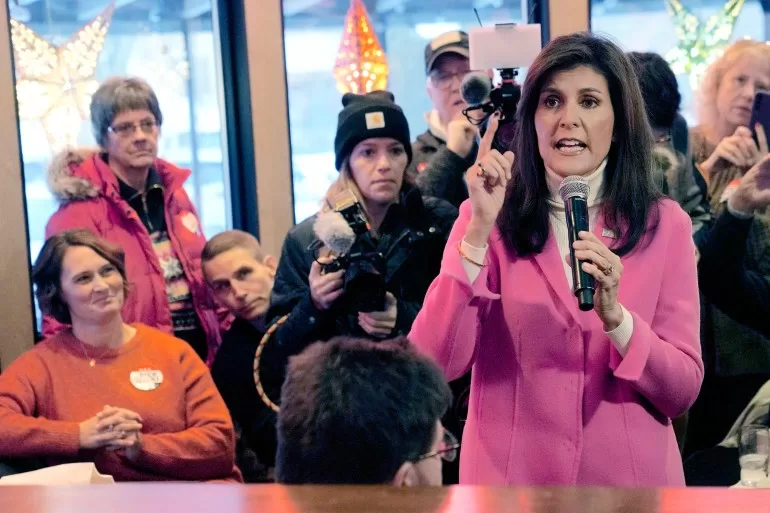Duelling primary vote and caucuses meant Nikki Haley and Trump did not go head-to-head in the southwestern state.
The results were far from a surprise, with Trump only facing longshot candidate Ryan Binkley in the caucuses. His top challenger Nikki Haley skipped the event, saying its organisers had heavily skewed the vote in Trump’s favour.
As of Friday, he had claimed more than 99 percent of the about 60,000 votes cast in the caucuses.
“We’re leading everybody,” Trump said in a victory speech from Las Vegas.
“Is there any way we can call the election for next Tuesday?” he added. “That’s all I want.”
Trump has so far come in first in the first three states in the US primary season, which determines which candidate the two main parties in the country – Republicans and Democrats – nominate as their challenger in the presidential election.
Trump’s victory means he will add Nevada’s 26 delegates to his tally. The candidate who collects the most delegates across the country will be named the party’s nominee during the Republican National Convention in July.
The Republican nominee is set to face President Joe Biden in the November general election. Biden currently has no major challenge from within his party for the ticket.
‘Sealed up, bought and paid for’
Still, Thursday’s victory largely rang hollow in the absence of Haley, who instead participated in a separate – and purely symbolic – primary vote in Nevada on Tuesday.
The duelling events were the result of a clash between the Republican Party and legislators in the state.
In 2021, the Democrat-dominated state legislature passed a law requiring that Nevada hold a primary vote, which resembles a traditional election. The Republican Party in Nevada had, for decades, held caucuses, which are gatherings across the state where registered Republicans debate and choose a candidate.
In protest against the new law, Republicans in the state said they would still hold their caucuses. The party has the final say over how state delegates are divvied up, meaning only the caucuses carried weight in the nomination process.
For her part, Haley has accused Republicans of moving ahead with the caucuses to boost Trump. Caucuses typically bring out only the most passionate members of the party, who skew more in favour of Trump.
Primaries tend to bring out a wider swath of the party’s voter, which could have benefitted Haley. She had previously dismissed the caucuses as “sealed up, bought and paid for”.
She again called the process “rigged” after she finished behind the “none of these candidates” option in Tuesday’s vote.
Brushing off the result, she said her campaign had never taken the race seriously, telling Fox News they had planned not to “spend a day or a dollar in Nevada”.
On to South Carolina
From Nevada, the Republican primary schedule now moves to South Carolina, where Haley had previously served as governor. Despite the local roots, Trump remains popular in the deeply conservative state.
A loss in South Carolina could be a death knell for Haley’s dimming prospects.
Nevertheless, the future of the race remains far from certain, with Trump facing four separate criminal indictments.
Earlier this week, a federal appeals panel ruled that Trump can face trial on charges that he plotted to overturn the results of the 2020 election. It rejected his claims that he is immune from prosecution.
Colorado and Maine have also said Trump cannot appear on their primary ballots, citing his efforts to overturn his 2020 election loss.
On Thursday, the US Supreme Court heard arguments Colorado’s disqualification of Trump. Lawyers for the state argued Trump’s actions constituted insurrection, making him unable to run under the US Constitution.
